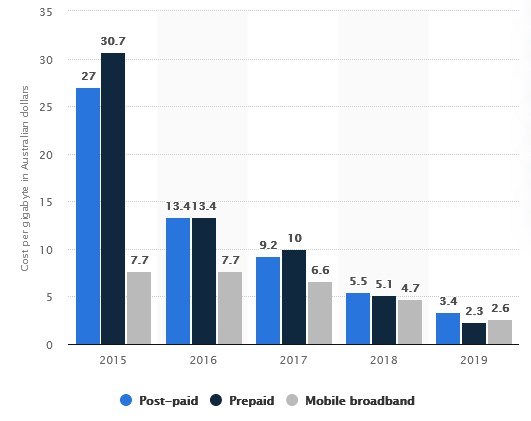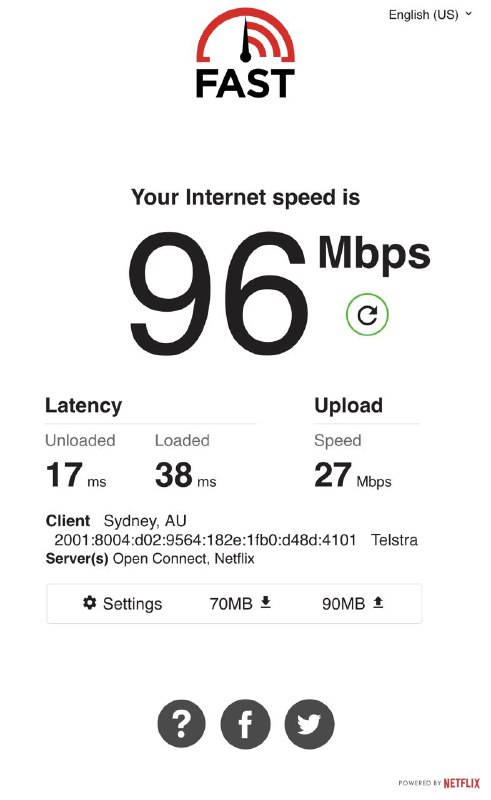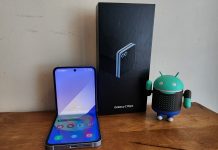As someone who’s relied on 4G internet for two years because we lived in a place that NBN forgot (thanks, shady developers) I never really thought I’d pen a story about mobile wireless rivalling fixed line services.
I certainly never thought I’d refer to 4G being able to best NBN … but after a couple of years with NBN connectivity, the rise in mobile speeds and the drop in mobile prices, I reckon there’s a sizable competition to NBN just around the corner … if it isn’t here already.
Unlike the cost of food, fuel and consumer goods, the relative cost of mobile data continues to drop; in just the last financial year (2019-2020) those prices typically fell by around 17%. NBN’s prices, in that same time period, dropped by just 2%.

There has been much said about 5G plans providing competition to NBN, but with such limited coverage (and only two of our three major networks supporting 5G in any meaningful way) the competition isn’t there just yet.
This is especially true when you think of major data consumers; someone like me who moves a couple of terrabytes of data each month probably wouldn’t cope on a mobile plan, but my usage is far from typical.
Mobile broadband is capable of serving the typically “fixed line” needs of many; with speeds that are faster than the average NBN connection and data allowances more than sufficient for a few users in the household, there’s a good number of users finding that instead of paying up to $80-120 a month for NBN, they can up their mobile bill – that they already pay – and get enough data to meet their family needs.
With the average NBN customer using around 250GB of data a month, that’s quite a lot over a mobile service, but there’s providers offering these huge inclusions (with a mobile service, too, don’t forget) for reasonable prices:
- Optus offers a $55/m service with 200GB data (for 12 months, reverting to $65/m after)
- $65 a month gets you 500GB a month, reverting to $119 after 12 months.
- Vodafone, too, offers that 200GB figure for $55 a month (then $65 after a year).
There’s prepaid options too, from Kogan, Lebara and Boost (though be careful of that last one – $300 gets you 300GB, but it’s to use over 12 months.. a heavy user would burn through that a bit fast).
This thought – upping one’s mobile spend and ditching the NBN – occurred to me over the last few days when I’ve been away from home (after working at home for much of the year). With Telstra 4G offering speeds well over 200mbps in a number of places around Sydney where you mightn’t expect such speed, the majority of NBN users who can’t reach (much less exceed) 100mbps fixed line speeds must surely be thinking about faster options, and there’s no need to wait for 5G in most cases.
Even Vodafone, with its albatross-like history of not having the best network, provides great speeds in most places around Sydney. You could easily power your household on Vodafone 4G to meet browsing, streaming and staying in touch needs. In many cases, too, Vodafone’s network exceeds the 100mbps ceiling for most NBN users.

Even sitting here at my desk, Telstra’s 4G service – with 1 bar of signal, mind you – easily matches an NBN 100/40 plan. For families without huge disposable incomes, putting the phone on charge and turning on the hotspot feature can deliver a household’s internet needs with ease.
Of course, for gigabit speeds, fixed line is – for now – in the lead, with NBN’s Fibre to the Premises delivering some of the fastest real-world internet speeds available in the country. 5G can match this – and exceed it – and in just a year or two will probably offer comparable speeds, coverage and data inclusions for a price point.
These trends should have NBN worried. In a cost sensitive environment, where people are constantly on the lookout for best bang for buck, NBN (and its retail service providers) cannot afford to be complacent. No doubt, it is this concern that gave rise to announcements earlier this year that NBN would overbuild some of the worst performing parts of its network with a full fibre rollout to bring faster speeds (or, at least, the possibility of those speeds) to a much greater percentage of Australian households.
Will gigabit speeds for most households by 2023 – NBN’s stated goal – be enough to ward of the wireless competition? If the prices continue to fall, speeds continue to improve and inclusions continue to grow … one wonders if gigabit will be enough.
Sure, now, in 2020, there’s not a huge need for gigabit speeds – we’ve tried it, and quickly dialled back the speeds somewhat (we use a 400mbps service now, and that exceeds our typical requirements) and colloquially, most FTTP users – and those who’ve paid to upgrade to FTTP – don’t use those faster speeds, instead relying on the better technology for increased reliability.
That is, after all, one of the main reasons we upgraded.
For now, though, with most users unable to get gigabit speeds anyway, the mobile option might be a very viable one for many. For the typical household with school-age kids, there’s no one home during the day and thus no need for connectivity. Switching on the hotspot when you get home to do kids homework, watch a bit of Netflix and then head to bed might be a much cheaper option.
What do you use at home? Would a mobile plan with higher inclusions meet your needs?





I’ve been using Optus 4G and now 5G for the last few years as my primary internet.
Considering I was downloading at up to 500Mbps last night, I see no need to change. Since I’m renting it also means when I move I don’t have to go through any sort of ordeal, just plug the modem into power at the new location.
I would never consider using 4G as a main internet steaming service where I live due to bad cell reception and datacaps whereas I get 100Mbits basic pack with unlimited data on fiber. .
I thought about setting my Mum up with one mobile plan for both her phone and internet usage, but in the end, decided to get her a NBN internet service and keep the mobile separate. The pure mobile option was about $10/month cheaper, but I decided to split the risk – if the mobile network is down, the NBN internet is likely to still work, and vice-versa.
Sounds like you must have really bad internet service in Australia…
4g home internet is $75 per month on 24 month plan for 500gb. Don’t know where your $65/ month for 12 months then $119/month comes from. Defies any marketing logic. Used for 12 months until nbn came to my house. Overall v good, but slow at peak times, and definately slower over that 12 months as more customers signed up.
I have begged these so called mobile service providers for better coverage at my previous home( just 8 km from Melbourne CBD) because NBN was not available at that time and the only fixed internet solution was ADSL. It was a tremendous relief when NBN came along after using a useless fixed wireless solution from a famous operator . I believe these providers should be monitored for coverage gaps and they should guarantee coverage and speed. If they don’t comply, they should be penalised.
I switched from NBN fixed wireless to Optus 4G some time ago and have not looked back. The two services come from the same tower but NBN was delivering as little as 3Mb/s in peak times, and about 20 off peak. On Optus I reliably get 70+Mb/s down and 40 up all day long, for about the same price. It was actually an NBN engineer who recommended I try Optus after 3 years of unresolved complaints about the NBN service.
as long as you’re close to a tower, there are not too many other people using it and have plenty of your quota left, 4G mobile might be ok. at the moment not many providers, have a unlimited 4G plans compared with landline plans
4g would be twice as as fast as the NBN at my Tasmanian FTTN house. With a teenager in the house the current data caps are too low to swap over. But I’m waiting for the day
Mobile Internet, And that’s just what I have done. With Optus and a 200gb plan, a month for $65-00. On 4g I sometimes get speeds upto 160 but normally it’s around the 70 mark. I’m not in a good reception area but still get good speeds and have no contract. Im single, retired and watch lots of 4k streaming content for hours daily or stream music at home and never get near using my limit.
Lucky you then. We are also in an NBN-forgotten place (in Sydney Metro …) and have to rely on Optus 4G Home Broadband. On a good day, we get about 25bps … on a bad one it could go down to 3bps. I, for one, can’t wait to get wired NBN internet (maybe next month finally …)